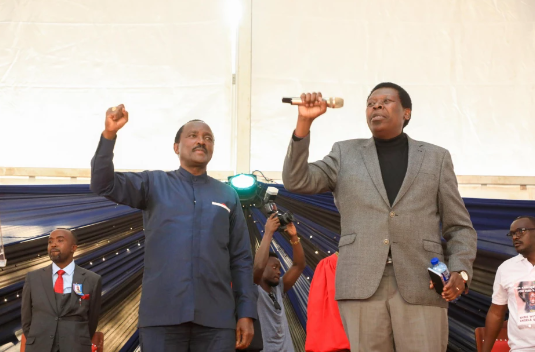Prominent leaders allied with the Azimio la Umoja coalition have demanded the resignation of President William Ruto while expressing solidarity with young Kenyan protestors.
Addressing journalists in Meru County, Wiper leader Kalonzo Musyoka praised the youth, now referred to as Gen Z, for their ongoing protests against the ruling government and encouraged them to continue.
He also commended the Senate for supporting the need for austerity measures demanded by Gen Z, stating that the government is plagued by corrupt individuals who continue to loot public resources.
“They have carried the spirit of SabaSaba and today as they take the streets I want them to know that the Azimio leadership stands with them,” said Kalonzo.
“The Senate has stood firm and for once asked for accountability in support of the agenda by GenZ. The corruption continues unabetted, a lot of money is collected and no accountability is there. The problem is not the collection but the consumption, the opulence, and greed by leaders.”
DAP-K party leader Eugene Wamalwa further called for the ousting of President Ruto arguing that all his reforms are just “cosmetics” to quell public rage.
“Ruto and his government should know that he and his government no longer enjoys the confidence of the people of Kenya. On this SabaSaba day we would want to urge the Gen Zs that the mission is not done until Zakayo ashuke (Ruto comes down),” said Wamalwa.
The leaders further praised the youth for commemorating the SabaSaba protests by taking to the streets on July 7 to honor Kenyans killed during the protests. The Kenya National Commission on Human Rights (KNCHR) reported that the nationwide protests resulted in 39 deaths and 361 injuries.
SabaSaba, a historically significant day for Kenya, is observed annually to remember the events of July 7, 1990, when nationwide protests demanded multiparty democracy. On that day, Kenya experienced its largest nationwide protests, initiated by leaders such as Kenneth Matiba and Charles Rubia, who had been arrested a few days earlier.
Over 20 people reportedly died, and thousands were injured. As a result, former President Daniel Moi’s government succumbed to pressure and allowed political pluralism.



